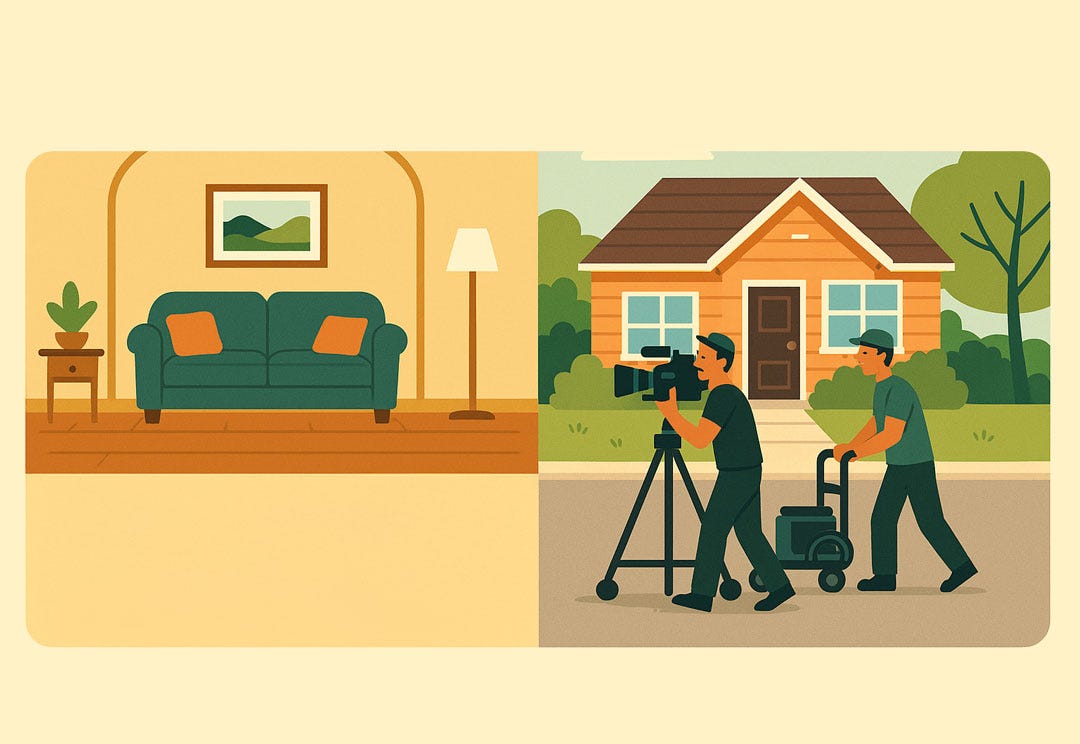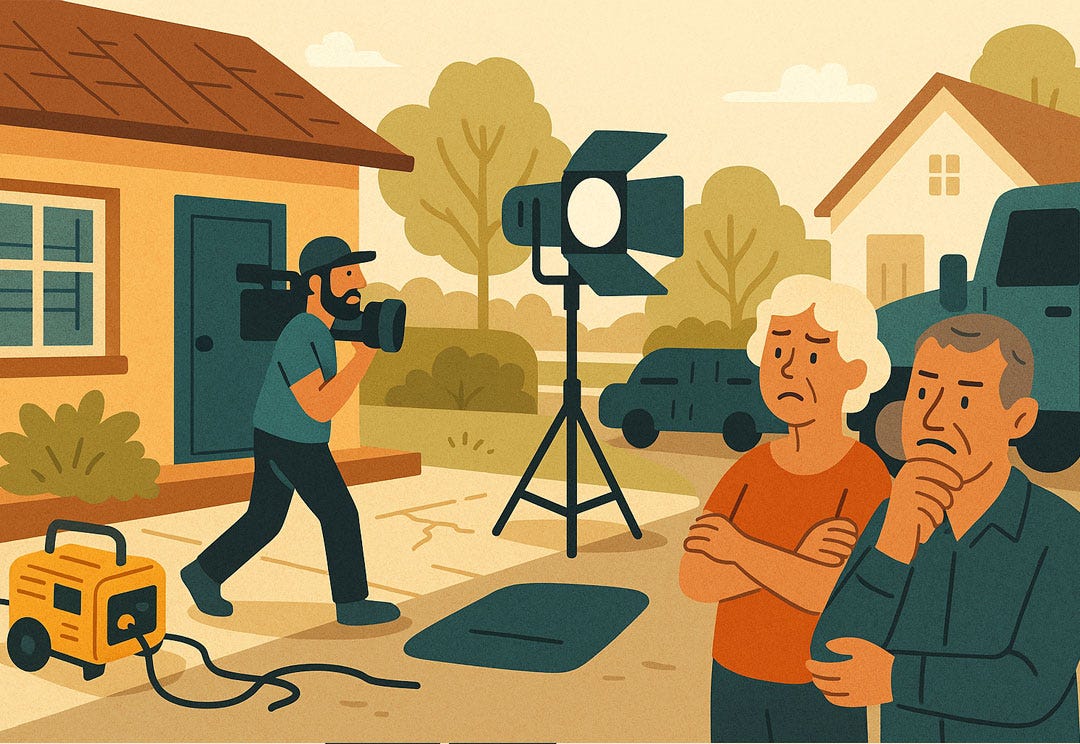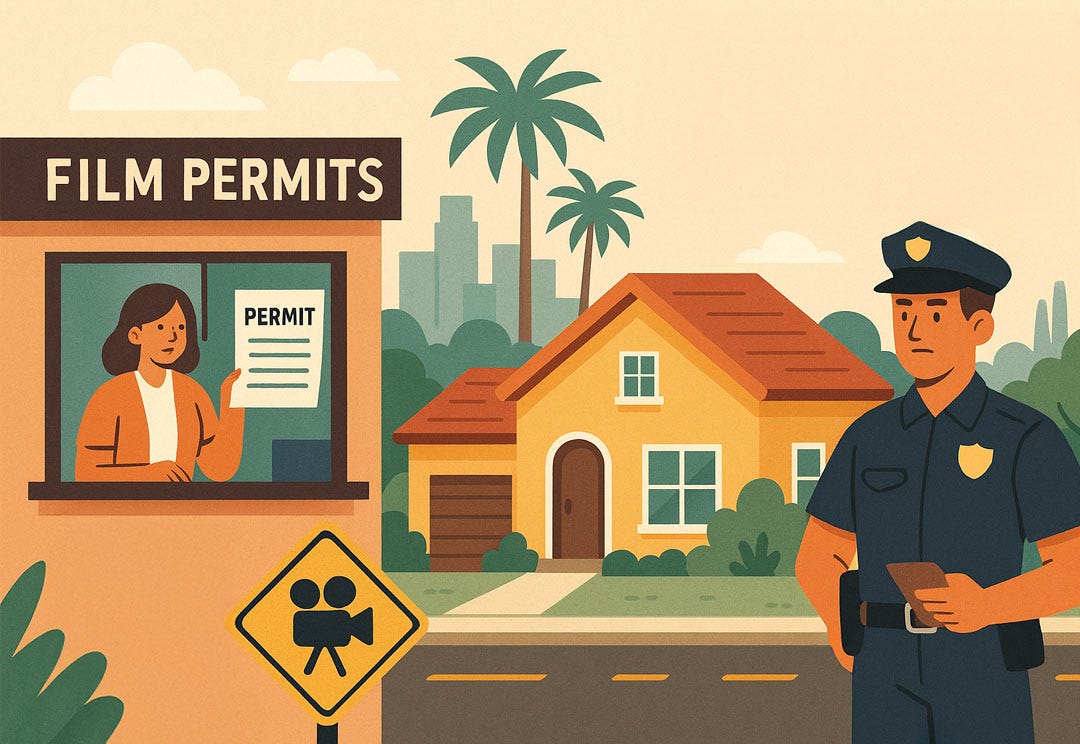Blog
Keep updated with recent real estate news.
Renting Out Your Home for Film Shoots: Pros, Cons, and Insurance Tips

Renting Out Your Home for Film Shoots: Pros, Cons, and Insurance Tips
Los Angeles is the undisputed entertainment capital of the world, and while studio lots are iconic, a significant portion of its magic unfolds right in our neighborhoods. From the grand mansions of Beverly Hills to charming bungalows in Silver Lake, residential properties are constantly in demand for film, TV, and commercial shoots. In fact, despite recent industry shifts, FilmLA still reported over 23,000 shoot days in Los Angeles in 2024, with various categories like still photography and independent features seeing consistent activity.
Have you ever wondered if your home could be the next backdrop for a blockbuster or a major commercial? This guide will walk you through the pros, cons, and essential insurance tips to help you decide if renting out your property for film shoots aligns with your income goals.

Why Production Companies Choose Houses
While Hollywood boasts impressive sound stages, they simply can’t replicate the lived-in authenticity of a real home. Production companies seek out residential properties for several compelling reasons:
- Authentic Interiors and Street Views: Your unique architecture, interior design, and surrounding neighborhood offer a realism that’s difficult and costly to build on a studio set.
- Lower Daily Rates: Renting a residential property often comes with a more attractive daily rate compared to the high overhead of fully dressed studio sets.
- Flexible Zoning: Most single-family neighborhoods in Los Angeles allow short-term filming with the proper permits, making them accessible and convenient for various productions.
Typical Earnings and Fee Structure
The potential income from renting your home for a film shoot can be quite attractive. While rates vary based on location, size, unique features, and the type of production, a three-bedroom house in Los Angeles might command an average day rate of $2,000–$4,000.
Beyond the base day rate, you can expect:
- Prep Day Charges: Often a percentage of the full shoot day rate (e.g., half or two-thirds) for the crew to set up equipment, lighting, and props.
- Shoot Day Charges: The full agreed-upon daily rate for the active filming period.
- Strike Day Charges: Similar to prep days, for the crew to dismantle and pack up.
Extra Fees: Be sure to factor in additional charges for:
- Overtime: If filming extends beyond a standard 10 or 12-hour day.
- Cleaning: To restore your home to its original condition.
- Parking: For production vehicles, often requiring street closures or use of your property.
- Generator Use: For significant power needs, which can be noisy and require specific placement.
Sample Shoot Budgets (Approximate Day Rates):
- Still-Photo Shoot (10–15 crew): Often on the lower end, from a few hundred to $1,500+ per day.
- TV Commercial (30–50 crew): Typically in the $2,000–$5,000+ per day range.
- Streaming-Series Episode (60+ crew): Can range from $4,000 to $10,000+ per day, especially for multi-day shoots.
(Source: Peerspace and Giggster public listings; union location agreement templates.)

The Upside for Homeowners
For the right homeowner, the benefits can be significant:
- High Income in a Short Time Window: A few days of filming can generate income equivalent to weeks or months of traditional rental income, without the commitment.
- No Long-Term Tenant Obligations: You avoid the complexities of leases, tenant screening, and ongoing maintenance responsibilities that come with long-term rentals.
- Ability to Block Out Dates: You retain control over your property, allowing you to choose when to host shoots around your personal schedule and travel plans.
- Occasional “Exposure Boost”: For unique, historic, or architecturally significant properties, a film shoot can provide a unique form of publicity or simply be a fascinating story to tell.

Real-World Drawbacks
It’s not all glamour, however. Be prepared for the realities of hosting a production:
- Wear and Tear: Floors, paint, and landscaping can suffer minor scuffs, dings, or wear from heavy foot traffic, equipment movement, and set dressing.
- Early Call Times & Noise: Crews often start very early, meaning noise from generators, trucks, and conversations can begin before dawn.
- Crew Parking: Large productions require significant parking, which might impact your street or necessitate securing additional spaces.
- Temporary Displacement: Depending on the scale and nature of the shoot, you and your family may need to vacate your home during filming days.
- Neighbor Objections: Frequent shoots or disruptive activities can lead to complaints from neighbors about noise, parking, or inconvenience.

Insurance and Liability Must-Haves
This is arguably the most crucial section. Never allow filming without robust insurance in place.
- Production Company’s General Liability: The production company must carry comprehensive general liability insurance, typically $1 million to $2 million, and name you (the homeowner) as an “additional insured” on their policy. Request a certificate of insurance well in advance.
- Workers’ Compensation: Verify that the production company has a valid workers’ compensation certificate to cover any injuries to their crew on your property.
- Short-Term Homeowner’s Rider: Consider contacting your own homeowner’s insurance provider about a short-term rider or endorsement. While the production’s policy should be primary, a rider can offer additional protection for your personal property beyond standard limits, especially for high-value items.
- Written Location Agreement: Always, always use a detailed written location agreement or contract. This document should clearly outline dates, times, rates, responsibilities for repairs, clean-up, and specific clauses regarding any potential damage.
- Condition Photos: Before any crew arrives, take extensive, date-stamped photos or video of your home’s condition, both inside and out. Repeat this walk-through and documentation process immediately after the shoot ends.

Permits and Local Regulations (Snapshot)
In Los Angeles, FilmLA is your primary resource for understanding and obtaining necessary film permits.
- FilmLA as Clearinghouse: FilmLA acts as the official film office for the City and County of Los Angeles, coordinating permits and ensuring compliance with local regulations.
- Application Fees & Triggers: There’s a base application fee, but additional costs can arise. For instance, police officers or fire safety monitors are often required for activities involving prop weapons, special effects, or significant public impact. You’ll also have notice requirements for neighbors, with FilmLA facilitating this notification process.
- LADOT Approvals: If the shoot requires street parking restrictions, lane closures, or other impacts on public roadways, separate approvals from the Los Angeles Department of Transportation (LADOT) will be necessary.

How to List Your Home
Ready to explore listing your property? Here are the main avenues:
Online Marketplaces:
- Peerspace: A popular platform for booking unique spaces for various events, including film and photo shoots.
- Giggster: Specializes in locations for film, photography, and events.
- Set Scouter: Another platform connecting productions with unique properties.
Location Agents: You can work with a professional location agent who will scout your property, handle the listing, negotiations, and logistics for a percentage of the booking fee. This can be less hands-on but reduces your earning potential.
Listing Yourself: If you’re comfortable managing inquiries and negotiations, listing directly on platforms allows you to retain a higher percentage of the fee.
Photos and Description Tips: High-quality photos are critical. Highlight:
- Ceiling Height: Crucial for lighting and camera angles.
- Power Capacity: Productions need to know if your electrical system can handle their equipment.
- Parking: Ample parking, both on and off-street, is a major plus.
- Clear Sight Lines: Open spaces, wide hallways, and uncluttered rooms are appealing for filming.
Day-Of Logistics Checklist
A smooth shoot day relies on careful preparation:
- Secure Valuables: Move all irreplaceable items, expensive electronics, medications, and personal photographs to a locked room or off-site storage.
- Confirm Essentials: Discuss and confirm the load-in route for equipment, designated crew meal areas (inside or out), and the plan for restroom access and usage.
- Walk-Through with Location Manager: Conduct a thorough walk-through with the production’s location manager both at the start and end of the shoot. Document any damage immediately with photos and notes.
After the Shoot
Your work isn’t quite done when the crew leaves:
- Final Payment & Security Deposit: Ensure you collect the final payment as per your agreement and return any security deposit balance promptly once you’ve confirmed no damage.
- Damage Reporting & Repairs: If damage occurred, file incident reports as per your contract and coordinate repairs. Keep detailed records of all costs.
- Tax Reporting: Remember to keep meticulous records of all income, cleaning fees, mileage, and repair receipts. Film rental income is typically reported on Schedule E of your tax return.
Quick FAQ
- Can an HOA or historic overlay ban filming? Yes, HOAs can have rules against commercial activities, and historic preservation districts might have additional restrictions or require special approval for alterations, even temporary ones. Always check your HOA bylaws and local historic commission guidelines.
- How many shoots can I host before it counts as a business? This varies by municipality and tax law. Generally, if it’s frequent and constitutes a primary income stream, it could be considered a business. Consult a tax professional for guidance specific to your situation.
- Do short-term film rentals affect primary-residence tax status? Usually not for occasional shoots, but if your home is primarily used for rental income, it could impact deductions or capital gains exclusions. Again, consult a tax advisor.
- Are student films covered by the same insurance rules? Reputable student film programs often require their students to carry liability insurance, but the limits might be lower. Always verify their insurance and obtain a certificate, and consider if the risk is acceptable for a lower fee.
Final Thoughts
Renting your home for film shoots can be a lucrative and exciting venture, offering a unique way to generate substantial income in a short period. However, it’s not without its challenges. By diligently addressing permits, ensuring comprehensive insurance coverage, utilizing written contracts, and meticulously documenting property condition, you can mitigate risks and maximize your potential earnings.
For homeowners curious about this opportunity, we recommend starting with a single, lower-impact shoot, such as a still photography session or a small commercial. This will allow you to gauge your comfort level with the process and understand the real-world implications before committing to larger, more involved productions. Good luck?—?your home could be camera-ready!



